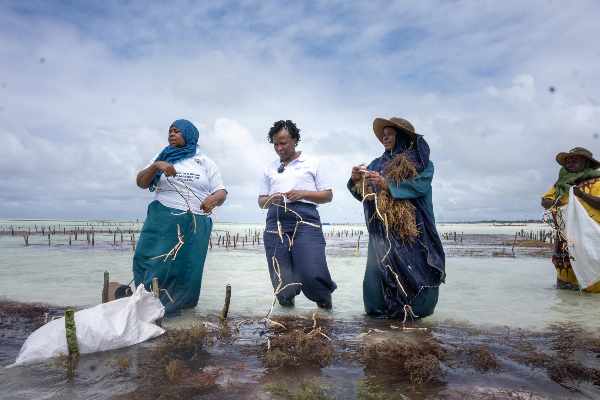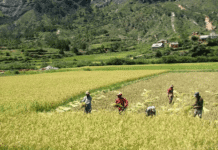
Women seaweed farmers along Tanzania’s coast are transforming one of the country’s oldest marine traditions into a climate-resilient, income-generating enterprise that is reshaping livelihoods and empowering communities.
Through United Nations-backed initiatives, local cooperatives are receiving technical, financial, and marketing support to expand seaweed production, improve post-harvest handling, and add value through processing into cosmetics, food additives, and fertilizers.
In Zanzibar and other coastal regions, where up to 88 percent of seaweed farmers are women, this shift is enabling female entrepreneurs to move beyond subsistence farming and take control of their economic futures.
“The role of the UN is supporting women to scale up this business, to take seaweed and actually make it into a business,” said Susan Ngongi Namondo, UN Resident Coordinator in Tanzania.
The initiative is supported by the Joint SDG Fund and is helping smallholder farmers transition from traditional shallow-water cultivation to deeper-water farming systems that are more resilient to temperature fluctuations, disease, and saltwater intrusion.
According to project implementers, the programme targets more than 15,000 farming households across Unguja and Pemba islands, most of them women and youth, with a goal of increasing average incomes by 40 per cent by 2028.
Women are also being trained in financial literacy, cooperative governance, and entrepreneurship to strengthen their ability to access markets and negotiate fair prices.
These interventions come as seaweed farming faces mounting challenges from climate change, rising sea temperatures, and declining global prices, which have made traditional farming methods less viable.
By providing boats, ropes, buoys, and cold storage facilities, the programme seeks to stabilize production while building community capacity for innovation and resilience.
A recent UN Sustainable Development Group report released late last month highlighted the seaweed sector as a key example of how gender-responsive and locally led adaptation can accelerate progress toward the Sustainable Development Goals (SDGs).
The report emphasised that empowering women within the blue economy not only enhances economic participation but also strengthens food security, biodiversity conservation, and social inclusion.
In Zanzibar, seaweed income has allowed many women to educate their children, invest in housing, and start small retail or food enterprises, contributing to gradual shifts in traditional gender roles.
Still, challenges persist, as only about 1 per cent of Tanzania’s harvested seaweed is processed domestically, meaning most of the value is captured abroad through exports of raw materials.
Global demand fluctuations and inconsistent quality standards also affect farmers’ earnings, while limited access to credit and infrastructure hinders local value addition.
“Women’s traditional ecological knowledge matters,” said Namondo, noting that their deep understanding of tidal patterns and marine conditions provides vital insight for adapting to climate stress.
By integrating traditional knowledge with scientific innovation, the initiative aims to create sustainable aquaculture systems that protect marine ecosystems while improving livelihoods.
The UN programme aligns with Tanzania’s national development agenda, which seeks to diversify coastal economies and enhance resilience to climate impacts under the blue economy framework.
It also supports the government’s efforts to develop seaweed processing industries that can generate jobs, increase export earnings, and reduce poverty in coastal regions.
The report described the Tanzanian seaweed initiative as an example of locally driven, climate-resilient pathways toward the SDGs underscoring the power of community-led innovation in achieving sustainable development.
“If these efforts continue to gain traction, Tanzania’s women seaweed farmers could become a model for inclusive growth—demonstrating how empowering women in coastal livelihoods can drive both economic transformation and environmental stewardship,” stated the report in part.







